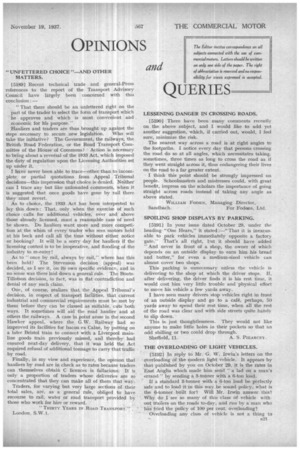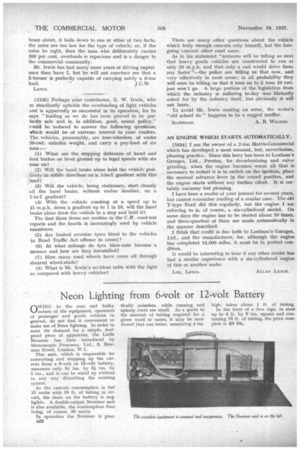OPINIONS
Page 23

Page 24

If you've noticed an error in this article please click here to report it so we can fix it.
and
QUERIES
"UNFETTERED CHOICE "—AND OTHER MATTERS.
• [51891 Recent technical trade and general-Press 'references to the report of the Transport Advisory Council have largely been concerned with this conclusion:— " That there should be an unfettered right on the part of the trader to select the form• of transport which • he approves and which is most convenient and econonik for his purpose." Hauliers and traders are thus brought up against the steps necessary to secure new legislation. Who will take the initiative? The Government, the railways, the British Road Federation, or the Road Transport Committee of the House of Commons? Action is necessary tobring about a'reversal of the 1933 Act, which imposed the duty of regulation upon the Licensing Authorities set up under it.
I have never been able to trace—other than to incomplete or partial quotations from Appeal Tribunal decisions—this impression that choice is denied. Neither can I trace any but like unfounded comments, when it is suggested that once goods have gone by rail there they must revert.
As to choice, the 1933 Act has been interpreted to lay this down : That, only when the exercise of such choice calls for additional vehicles, over and above those already licensed, must a reasonable ease of need be shown. Do hauliers want more and more competition at the whim of everylrader who sees motors held at his beck and call all the time without either notice or booking? It will be a sorry day for hauliers if the licensing control is to be inoperative, and flooding of the industry to re-enter!
. As to "once by rail, always by rail," where has this been held? The Stevenson decision (appeal) was decided, as I see it, on its own specific evidence, and in no sense was there laid down a general rule. The BoutsTillotson decision, in fact, was in flat contradiction and denial of any such claim.
One, of course, realizes that the Appeal Tribunal's decision, in respect of transport facilities, that current. industrial and commercial requirements must be met by them before they can be classed as suitable, cuts both ways. It sometimes will aid the road haulier and at others the railways. A case in point arose in the second Hawker appeal, where the G.W. Railway had so improved its facilities for bacon ex Caine, by 'putting on a later Bristol train to connect with a Liverpool mainline goods train previously missed, and thereby had ensured next-day delivery, that it was held the Act required refusal of additional tonnage to carry that traffic by road.
Finally, in my view and experience, the opinion that hauliers by road are in check as to rates because traders can themselves obtain C licences is fallacious. It is only a proportion of traders whose deliveries are so concentrated that they can make all of them that way.
Traders, for varying but very large sections of their total sales, are, as a general rule, obliged to have recourse to rail, water or road transport provided by those who work for hire or reward.
THIRTY YEARS IN ROAD TRANSFORT." London, S.W.1. LESSENING DANGER IN CROSSING ROADS.
[51901 There have been many comments recently on the above subject, and I would like to add yet another suggestion, which, if carried out, would, I feel sure, minimize the risk.
The nearest way across a road is at right angles to the footpaths. I notice every day that persons crossing the road do so at all angles, which necessitates taking, sometimes, three times as long to cross the road as if they went straight across it, thus endangering their lives on the road to a far greater extent.
I think this point should be strongly impressed on people. Schoolmasters and mistresses could, with great benefit, impress on the scholars the importance of going straight across roads instead of taking any angle as above stated.
Wit.nram FODEN, Managing Director, Sandbach. For Foderis, Ltd.
SPOILING SHOP DISPLAYS BY PARKING.
(51911 In your issue dated October 29, under the heading "One Hears," it stated :—" That it is inexcusable to park vehicles immediately opposite a factory gate." That's all right, but it should have added " And never in front of a shop, the owner of which depends on an outside display to earn him his bread and butter," for even a medium-sized vehicle can almost cover two shops.
This parking is unnecessary unless the vehicle is delivering to the shop at which the driver stops. If, after delivering, the driver finds it is his rest time, it would cost him very little trouble and physical effort to move his vehicle a few yards away.
I have seen many drivers stop vehicles right in front of an outside display and go to a Café, perhaps, 51) yards away to spend their rest time, when all the rest of the road was clear and with side streets quite handy to slip down.
This is just thoughtlessness. They would not like anyone to make little holes in their pockets so that an odd shilling or two could drop through.
Sheffield, 11. A. S. PIEARCET THE OVERLOADING OF LIGHT VEHICLES.
[5192] In reply to Mr, G. W. Irwin's letters on the overloading of the Modern light vehicle. It appears by that published by you on Octbber 29, it is the rates in East Anglia which made him .send "a lad on a man's errand " by sending a 3-tonner with a 6-ton load.
If a standard 3-tonner with a .6-ton load be perfectly safe and to :load it in this way.be sound policy, what is the 6-tonner built for? Will Mr. Irwin answer this? Why. do It see so many of this -class of vehicle without trailers on the roads to-day, and run by a man who has fried the policy of 100 per cent. overloading?
Overloading any class of vehicle is not a thing to boast about, it boils down to one or other of two facts, the rates are too low for the type of vehicle, or, if the rates be right, then the man who deliberately carries 100 per cent. overloads is rapacious and is a danger to the commercial community.
Mr. Irwin has had many more years of driving experience than have I, but he will not convince me that a 3-tonner is perfectly capable of carrying safely a 6-ton load. J.C.W. Lancs.
(5193) Perhaps your contributor, G. W. Irwin, who so steadfastly upholds the overloading of light vehicles and is apparently so successful in its operation, for he says "loading as we do has been proved to be perfectly safe and is in addition, good, sound policy," could be induced to answer the following questions, which would be of extreme interest to your readers. The vehicles, presumably, are four-wheelers, of under 50-cwt. unladen weight, and carry a pay-load of six tons :— (1) What are the stopping distances of hand and foot brakes on level ground up to legal speeds with six tons on?
• (2) Will the hand brake alone hold the vehicle positively in .either direction on 1-in-7 gradient with this . load?
(3) Will the vehicle, being stationary, start cleanly off the hand brake, without undue shudder, on a 1-in-7 gradient?
(4) With the vehicle coasting at a speed up to lii m.p.h. down a gradient up to 1 in 10, will the hand brake alone draw the vehicle to a stop and hold it?
The first three items are routine in the C.M. road-test reports and the fourth is increasingly used by vehicle examiners.
(5) Are limited oversize tyres fitted to the vehicles (a Road Traffic Act offence to come)?
(6) At what mileage do tyre blow-outs become a menace and how are they forestalled?
(7) How many road wheels have come off through sheared wheel-studs?
(8) What is Mr. Irwin's accident ratio with the light as compared with heavy vehicles? There are many other questions about the vehicle which truly enough concern only himself, but the foregoing concern other road users.
As to his statement "someone will be telling us next that heavy goods vehicles are constructed to run at only 20 m.p.h. and that only a cad would drive theni any faster "—the police are felling us that now, and very effectively in most areas; in all probability they will soon be telling us that 6 tons on to 2 tons 10 cwt. just won't go. A large portion. of the legislation from which the industry is suffering to-day was blatantly asked for by the industry itself, but obviously it will not learn.
To avoid Mr. Irwin making an error, the writer's "old school. tie" happens to be a ragged muffler.
Scotstoun. A. R. 'WILSON.
AN ENGINE WHICH STARTS AUTOMATICALLY.
[5194] I am the owner of a 2-ton Morris-Commercial which has developed a most unusual, but, nevertheless, pleasing practice. Since this tarry has been to Loxham's Garages, Ltd., Preston, for decarbonizing and valve grinding, when the engine becomes" warm all that is necessary to restart it is to switch on the ignition, place the manual advance lever in the retard position, and the engine starts without any further effort. It is certainly uncanny but pleasing.
have been a reader of your journal for several years, but cannot remember reading of a similar case. The old T-type Ford did this regularly, but the engine I am referring to is, of course, a six-cylindered model. On some days the engine has to be started about 70 times, and three-quarters of these are made automatically in the manner described.
I think that credit is due both to Loxham's Garages, Ltd., and the manufacturer, for, although the engine has completed 14,000 miles, it must be in perfect condition.
It would be interesting to hear if any other reader has had a similar experience with a six-cylindered engine of this or another make.
Lea, Lancs. ALLAN LEIGH.




























